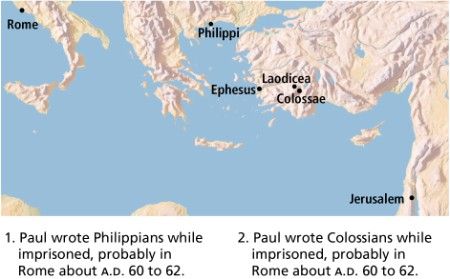To accompany your Come Follow Me study for October 9-15
In addition to reading the indicated chapters, you may wish to:
Read the applicable portion of the New Testament Institute Student Manual at :
See the following videos:
- Book of Philippians Summary: A Complete Animated Overview at Book of Philippians Summary: A Complete Animated Overview – YouTube
- Book of Colossians Summary: A Complete Animated Overview at Book of Colossians Summary: A Complete Animated Overview – YouTube
If you would like a Kahoot game related to this material which you could use for personal study or use with your family or your class, click here: https://create.kahoot.it/share/philippians-and-colossians/f1c6e3ff-4a27-488b-8a7c-aedc685ebf19 . (To use it with a group, after clicking on this link, you will need to log into Kahoot, creating a free account if you have not done so previously, then click on the blue “Start” button.)
Points to Ponder in Philippians and Colossians
1. How many times, by your count, does Paul use words such as “joy,” “rejoice,” “gladness,” or their synonyms in the book of Philippians? Why is Paul so happy, when he is in a miserable Roman prison and will never be a free man again in this life?

2. Are we entitled or obligated to be happy in every circumstance? Why? What beloved Christian hymn appears to borrow a phrase from Philippians on the subject?
3. Look at the various English translations of Philippians 1:21 at Philippians 1:21 – Bible Gateway. Which one do you like best? Then in your favorite translation of that verse read also through verse 26. Then, in your own words, briefly summarize why Paul would prefer to die and the reasons he thinks it would be best for him to continue living, and which he thinks is going to happen in the short run.
4. What, in brief, are two powerful messages which can be derived from Philippians 2:5‑9? See also 3:21.
5. Why should we fear and tremble as we work out our salvation? (Phil. 2:12) Shouldn’t we feel a spirit of rejoicing and peace instead?

6. In 3:8 Paul says he had suffered the loss of all things” for the sake of Jesus Christ. Briefly, what can you point to that Paul had given up by converting to Christianity?

7. Where have you seen the concepts of Philippians 4:8 before?
8. What would you need to add to Philippians 4:13 to make it strictly accurate? Where else do you find the same concept taught?
9. What other passages in Philippians did you mark as especially meaningful to you personally?
10. Colossians 1:15 is occasionally cited as evidence that no man could see God. What do you think Paul means by the term “the invisible God”?
11. In what two senses is Christ the “firstborn of every creature”? Why is not Colossians 1:15 conclusive evidence to non‑Latter-day Saints of our pre‑mortal existence?
12. What should be the Latter-day Saint attitude toward secular philosophy, in keeping with Paul’s counsel in Colossians 2:8?
13. What implications does Colossians 3:16 have for our singing in church?

14. What use could you make of the each of the following passages in missionary work? Can you give a mini-lesson built around each?
- Colossians 1:18
- Colossians 2:12
- Colossians 3:1
- Colossians 4:16
15. What other passages from Colossians did you particularly enjoy, and why?
Possible Answers to Points to Ponder in Philippians and Colossians
1. How many times, by your count, does Paul use words such as “joy,” “rejoice,” “gladness,” or their synonyms in the book of Philippians? Why is Paul so happy, when he is in a miserable Roman prison and will never be a free man again in this life?
My own count is 18 times. I could have missed one or two. Paul is a great example of the fact that happiness is due to our focus rather than our circumstances, as President Russell M. Nelson has repeatedly taught. See Joy and Spiritual Survival (churchofjesuschrist.org).
2. Are we entitled or obligated to be happy in every circumstance? Why? What beloved Christian hymn appears to borrow a phrase from Philippians on the subject?
It appears Paul would say we are both entitled and obligated. He says in Philippians 4:4, “Rejoice in the Lord always: and again I say, Rejoice.” That certainly sounds like a commandment, not merely permission. Charles Wesley’s text for the hymn “Rejoice, the Lord is King!” seems to borrow from Paul in the chorus, the first line of which reads, “Lift up your heat! Lift up your foice! Rejoice, again I say, rejoice!”
3. Look at the various English translations of Philippians 1:21 at Philippians 1:21 – Bible Gateway. Which one do you like best? Then in your favorite translation of that verse read also through verse 26. Then, in your own words, briefly summarize why Paul would prefer to die and the reasons he thinks it would be best for him to continue living, and which he thinks is going to happen in the short run.
Your choice. My own favorite this time is probably the Amplified Bible (AMP), which gives not only a translation, but a brief explanation of what Paul means. He personally would rather die, to be with Christ. But he feels it would be best for him to remain alive, for the sake of the saints in Philippi (and elsewhere). For that reason, he thinks the Lord will leave him alive for now in order to continue teaching and encouraging those whom he has come to love and who love him.
4. What, in brief, are two powerful messages which can be derived from Philippians 2:5‑9? See also 3:21.
In the King James Version, it appears that Paul is telling his readers (1) to have the same attitude as Jesus did, not thinking it was “robbery” or inappropriate to aspire to be equal with God. That would certainly harmonize nicely with the Latter-day Saint doctrine that man can become like God in the eternities ahead. At Philippians 2:6 – Bible Gateway you can see that eight other translations take a similar approach. However, (2) you will see that over fifty other translations render it differently, essentially having Paul say that Jesus didn’t presume to commit “robbery” and try to become equal to God, and neither should we. Philippians 2:7-8 would seem to support that view, as Paul emphasizes that Christ “took upon him the form of a servant” and “humbled himself, and became obedient unto death.” Someday we can ask Paul what he really intended. In the meantime, the Latter-day Saint doctrine about man’s future exaltation does not depend on Philippians, but is clearly taught in other scriptures and even more clearly in Joseph Smith’s King Follett Discourse. Among those other scriptural passages which seem to support man’s divine potential is Philippians 3:21, which assures us that just as God highly exalted Jesus (2:9), Jesus “shall change our vile body, that it may be fashioned like unto his glorious body” in the resurrection.
5. Why should we fear and tremble as we work out our salvation? (Philippians 2:12.) Shouldn’t we feel a spirit of rejoicing and peace instead?
We can feel both. As previously noted, Paul clearly wants us to rejoice. But he also wants us to take seriously the matter of qualifying for our salvation and “fear” to do anything which would prevent our receiving it. I like the New English Translation, which replaces “fear and trembling” with “awe and reverence.”
6. In 3:8 Paul says he had suffered the loss of all things” for the sake of Jesus Christ. Briefly, what can you point to that Paul had given up by converting to Christianity?
In brief, he:
- Gave up his position as a respected Pharisee and leader among the Jews.
- Gave up his profession as a tent maker.
- Gave up an opportunity for marriage and family in this life.
- Gave up a life of comfort and convenience.
- Gave up his former friends and associates.
- Gave up his freedom.
- Eventually gave up his life.
7. Where have you seen the concepts of Philippians 4:8 before?
The 13th Article of Faith mentions many of the same things that Latter-day Saints profess to “seek after.” Joseph Smith obviously thought Paul gave a pretty good summary here of the traits we should seek and the things in which we should delight.
8. What would you need to add to Philippians 4:13 to make it strictly accurate? Where else do you find the same concept taught?
Paul obviously meant, “I can do all things God wants me to do through Christ which strengtheneth me.” There is no promise that God will help us achieve anything we want, whether it’s good for us or advances His work or not. Nephi taught a similar principle in 1 Nephi 3:7, when he said: “The Lord giveth no commandments unto the children of men, save he shall prepare a way for them that they may accomplish the thing which he commandeth them.”
9. What other passages in Philippians did you mark as especially meaningful to you personally?
Your choice. Mine included:
- 1:14: Paul’s example inspired others to be similarly bold.
- 2:3: “Let nothing be done through strife or vainglory; but in lowliness of mind let each esteem other better than themselves.”
- 2:14: “Do all things without murmurings and disputings.”
- 3:20: But not in the King James Version, as “our conversation is in heaven” really doesn’t make any sense. Most English translations render it, “Our citizenship is in heaven,” which has a wonderful ring to it.
- 4:5: “Let your moderation be known unto all men.”
- 4:7: The peace of God passeth all understanding, known only to those who qualify to feel it.
- 4:11: “I have learned, in whatsoever state I am, therewith to be content.”
10. Colossians 1:15 is occasionally cited as evidence that no man could see God. What do you think Paul means by the term “the invisible God”?
He is invisible to the natural man. Certainly, Paul knew that God wasn’t always invisible, as the scriptures tell of many appearances of God to man. Paul himself, of course, testified to having seen the risen Jesus Christ, who, he says here, “is the image of the invisible God.” If Jesus wasn’t invisible to Paul on that occasion, neither would the Father be, if He chose to reveal Himself.
11. In what two senses is Christ the “firstborn of every creature”? Why is not Colossians 1:15 conclusive evidence to non‑Latter-day Saints of our pre‑mortal existence?
The phrase could refer to (1) Jesus being the oldest spirit child of God or (2) to His being the first one resurrected and in that sense “born” again from the grave, as the phrase is used in 1:18 . Because of the possibility that Paul is speaking of the same thing in 1:15, most would not be persuaded that this passage had to refer to a pre-mortal life in which Christ was born first, after which the rest of us were born, even though that is also true.
12. What should be the Latter-day Saint attitude toward secular philosophy, in keeping with Paul’s counsel in Colossians 2:8?
A healthy skepticism. This doesn’t mean we can’t study philosophy, or that it doesn’t have many truths to offer, but we should recognize that philosophy alone has never been a sufficient guide to truth.
13. What implications does Colossians 3:16 have for our singing in church?
Paul seems to say that
- We all should participate in singing and not consider it an elective activity.
- It is partly for the purpose of instructing each other, not merely something to do so we don’t have to listen to so many talks.
- We should recognize that we are singing “to the Lord” and not worry if our voices are not as melodious as those of others around us.
14. What use could you make of the each of the following passages in missionary work? Can you give a mini-lesson built around each?
- Colossians 1:18
- Colossians 2:12
- Colossians 3:1
- Colossians 4:16
- Colossians 1:18: It would be hard for Christ to be “head of … the church” without having ongoing communication with His living prophet.
- Colossians 2:12: “Buried with him in baptism” certainly suggests that baptism was to be done by immersion.
- Colossians 3:1: If Christ sits on the right hand of God, it suggests that God may have a right hand and that He and Christ are two separate beings.
- Colossians 4:16: This “epistle from Laodicea” is not part of our Bible and is currently lost. It is good evidence that not all of the word of God made it into our current Bible, so there is no inherent reason there couldn’t be other non-Biblical scripture, such as the Book of Mormon.
15. What other passages from Colossians did you particularly enjoy, and why?
My own list includes:
- 2:6: Paul exhorts us to “walk … in” Christ, which seems to be a nice combination of the Lord’s instructions to Enoch in Moses 6:34 to “abide in me” and “walk with me,” as emphasized by Elder David A. Bednar in the April 2023 general conference.
- 2:18-23: This is one of my favorite places to demonstrate that what is almost unintelligible to most readers of the King James Version becomes quite clear in more modern language versions, such as the New Living Translation, which you can read at Colossians 2:18-23 NLT – Don’t let anyone condemn you by – Bible Gateway.
- 3:2: A great reminder to set our affection “on things above, not on things on the earth.”
- 3:13-14: A reminder of the importance of charity, forgiveness, and patience with one another.
- 3:18:21: Great counsel for family relationships, similar to what Paul gave to the Ephesians in Ephesians 5.
- 3:23: A reminder that the spirit with which we serve is as important as what we do.
- 4:1: This counsel to slave owners toward their slaves in Paul’s day has similar application to employers and parents.
- 4:5-6: This counsel about how to live among those not of our faith makes much more sense in a translation such as the New Living Translation, which reads: “Live wisely among those who are not believers, and make the most of every opportunity. Let your conversation be gracious and attractive so that you will have the right response for everyone.”
